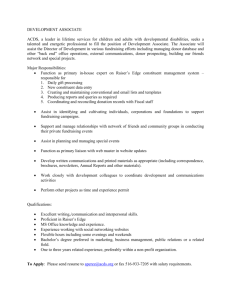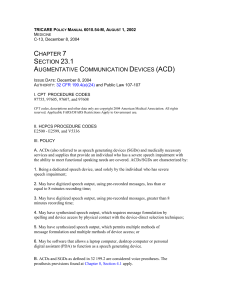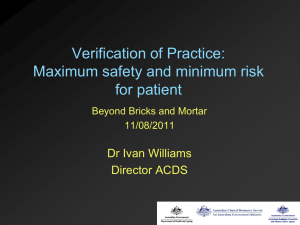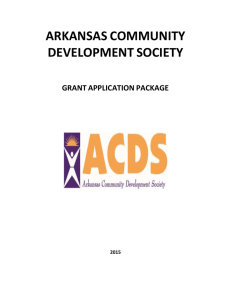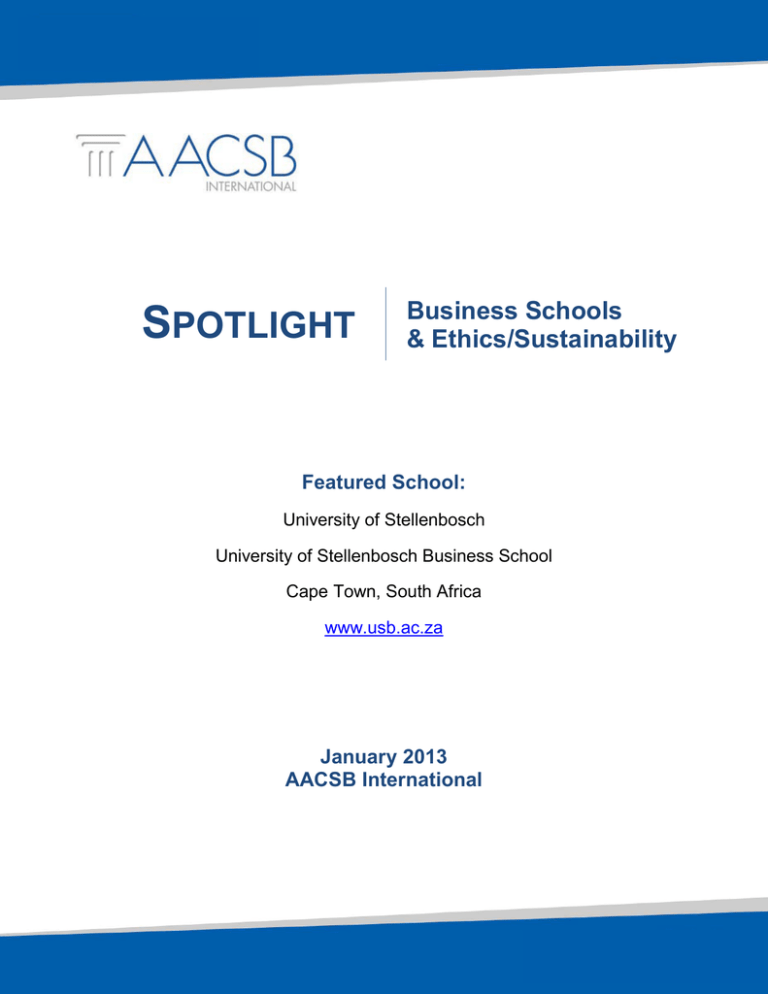
SPOTLIGHT
Business Schools
& Ethics/Sustainability
Featured School:
University of Stellenbosch
University of Stellenbosch Business School
Cape Town, South Africa
www.usb.ac.za
January 2013
AACSB International
SPOTLIGHT | Business Schools & Ethics/Sustainability
Universit
The Africa Centre for Dispute Settlement
The University of Stellenbosch demonstrates an overwhelming
commitment to academic initiatives that serve human need, both in South
Africa and in Africa as a whole. Through its HOPE Project, the university supports research, teaching and
outreach activities focused on five major themes:
•
Eradicating poverty and related conditions
•
Promoting human dignity and health
•
Promoting democracy and human rights
•
Promoting peace and security
•
Promoting a sustainable environment and a competitive industry
1
The University of Stellenbosch Business School (USB), the first AACSB-accredited business school in
sub-Saharan Africa, is one of the most deeply engaged of all the university’s academic units in the HOPE
2
Project, through its own social engagement initiatives. One aspect of USB’s engagement stands out in
particular, however, both for its unique character and the scope of its vision in “developing the theory and
practice of mediation in all its forms, with a special emphasis on conflicts involving economic actors”: The
Africa Centre for Dispute Settlement (ACDS).
3
Dr. Barney Jordaan, Director of the ACDS, says that USB was a natural fit for the development of the
Centre. Being legally trained himself, Dr. Jordaan makes the case that lawyers (and law schools) tend to
be naturally conservative when it comes to change, and very protective of their main territory (i.e.,
litigation), which to his mind is a less effective form of conflict resolution than the mediation techniques
promoted at the ACDS. People have become more aware that effective negotiation and dispute resolution
are integral parts of ethical business practice, he claims, and ultimately are superior to litigation in terms
of cost, time, and the preservation of good business relationships. South Africa has even taken steps
4
toward requiring mediation in civil cases, which Dr. Jordaan sees as an “extremely positive step.” Thus in
2007, when the Centre won approval to open from the university, the business school became its home.
The ACDS opened its doors in February 2008, under the patronage of Archbishop Emeritus and Nobel
Peace Laureate Desmond Tutu.
The HOPE Project at the University of Stellenbosch provided seed funding for the ACDS as part of the
Project’s 2020 initiatives, according to Dr. Jordaan. The Centre undertakes a wide range of activities in
support of HOPE, including scholarly research, consulting, educational and training programs, and even
the provision of actual mediation services. Many of these projects also provide sustainable revenue
streams that allow the ACDS to be mostly self-sufficient in terms of funding, Dr. Jordaan says, including
© AACSB International. All Rights Reserved.
SPOTLIGHT | Business Schools & Ethics/Sustainability
sponsorships from local and international corporations or government
entities for specific projects, or tuition from training and teaching
5
modules. The important thing to remember, he emphasizes, is that
everything the Centre does is designed to have real impact in the space
of conflict resolution, and in particular economic conflicts; therefore all
of the ACDS’ activities are structured around fulfilling this central
mission.
Conflict Resolution Research
Because of the nature of the ACDS as an academic center of the USB, Dr. Jordaan says, producing and
publishing scholarly research has to be a top priority. He stresses, however, that much of the Centre’s
research focus is on the application of theory in the space of conflict resolution for economic actors,
through what ACDS refers to as “action research.”
The University for Peace’s Africa Programme defines action research as an “an approach within peace
research in which the researcher abandons a detached stance and becomes part of the programme
6
team.” The Centre’s action research focuses on monitoring, evaluation, and the development of case
studies and theoretical frameworks for the application of mediation and other so-called “alternative
dispute resolution” (or ADR) techniques to resolve civil and commercial disputes without resort to costly
litigation. Researchers from ACDS go into the field jointly with stakeholders, to examine capabilities for
conflict prevention in sensitive economic and political environments. The point of the Centre’s action
research, according to Dr. Jordaan, is to deliver immediate, actionable insight to the local actors, as well
as broader value to headquarters organizations through comparative learning.
Dr. Jordaan says the Centre is currently involved in such action research with a major mining company in
Ghana. Closer to home, ACDS has also proposed a pilot project in the Cape Town municipality to
improve the capacity of municipal and township-level authorities to collaborate with the South African
national government to promote socio-economic development. While it is important to respect party
confidences, he notes, this work also makes significant contributions to more rigorous frameworks for
understanding and action, supporting USB’s curriculum development and teaching with regard to civil and
commercial mediation and negotiation techniques.
Education and Training
One key purpose of the ACDS is to try and establish mediation as a recognized, self-regulating
profession, according to Dr. Jordaan, along the lines of lawyers, doctors, accountants, etc. It's a
© AACSB International. All Rights Reserved.
Universit
SPOTLIGHT | Business Schools & Ethics/Sustainability
Universit
worldwide project that has been ongoing for many years, he says. In 2009, the Centre launched an
initiative to promote the development of and support for a uniform system of practitioner accreditation for
7
mediators. South Africa’s Dispute Settlement Accreditation Council (DiSAC) was created in 2010 as a
8
result of the ACDS’ efforts, and is currently housed at and coordinated by the Centre. ACDS personnel
now work to build capacity in mediation and arbitration techniques both locally and internationally, through
teaching courses in USB’s MBA program, and through various executive education and development
programs.
One of the most popular of these executive education courses is the ACDS’ five-day intensive Civil and
Commercial Mediation training, which prepares those who undertake it to apply for accreditation as a
9
mediator from DiSAC. The Centre for Effective Dispute Resolution (CEDR), a UK-based body that offers
advanced training and internationally recognized accreditation of training in mediation, also recognizes
this course as preparation for its accreditation.
10
Dr. Jordaan says that over 350 students have been
through this program, which is offered three to four times annually.
11
The ACDS is also South Africa’s only certifying body of the International Mediation Institute (IMI), and one
of only two on the entire African continent.
12
The IMI is a non-profit foundation
based in The Hague, Netherlands, which develops global professional
standards for experienced mediators and certifies individuals as meeting them.
Dr. Jordaan, himself an IMI-certified mediator, describes their certification as “a
rigorous and onerous process” for experienced individuals in the field. He
explains that the ACDS’ status as an IMI Qualifying Assessment Program
provider means that individuals who are assessed by the Centre (generally through one or more ACDS
training programs) and identified as meeting the IMI standards for accreditation can subsequently apply
for recognition by IMI as an certified mediator.
13
As of February of 2011, the ACDS now offers a full Postgraduate Diploma in Dispute Settlement,
awarded by USB.
14
This certification includes two required modules, one on conflict management and
dispute resolution, and one on consensus-building processes and skills. These are followed by one of two
elective modules, either the aforementioned Civil and Commercial Mediation executive training, or an
Introduction to Arbitration module (although both can be taken for an additional fee). The postgraduate
diploma program is intended to allow its graduates to establish themselves either independently or within
their organization as trained dispute mediators,
15
promoting what Dr. Jordaan calls the vision of the
ACDS, i.e., having business actors look to non-litigious conflict resolution as a first resort.
© AACSB International. All Rights Reserved.
SPOTLIGHT | Business Schools & Ethics/Sustainability
Universit
Collaborating to Build a Sustainable and Peaceful Future
Nothing that the ACDS undertakes is done in isolation, particularly given the nature of life on the African
continent. Dr. Jordaan acknowledges that South Africa, whose economy is frequently mentioned as one
of the premier emerging economies in the world alongside those of Brazil, Russia, India, and China (the
so-called BRICS), is often perceived as "the bully on the continent." As a result, he says that the Centre
staff strive to remain very conscious of the fact that the ACDS is but one player on the continent in the
mediation area. He says that their policy has always been to not compete with what is already in place,
but rather to collaborate, always keeping their focus is on economic actors.
According to Dr. Jordaan, the Centre works hard to develop collaborative efforts with domestic and
international institutions, in support of its mission. ACDS has already helped to establish a sister
institution, the European Centre for Dispute Settlement, at the Vlerick Business School in Belgium.
16
The
two centers work together to develop cases and test theoretical frameworks of best practices in dispute
settlement for economic and business actors across the two continents.
The Centre is now working to establish a Community-Business Conflict Prevention and Resolution
(CBCPR) network on the African continent. The CBCPR network is intended to provide Africa-wide civil
society platforms for networking, training, good practice reflection, peer support, and collaborative action
on conflict prevention and resolution, as well as promoting policy dialogue on relations between
businesses and the communities in which they operate. The network will also provide ACDS with
additional opportunities to pursue action research in more national and community contexts throughout
Africa.
Locally, ACDS is working to build a new Centre for Development Collaboration (CDC) in partnership with
the Graduate School of Business at the University of Cape Town. Dr. Jordaan indicates this joint center
will aspire to significantly impact development outcomes by studying, creating, evaluating, cataloguing
and disseminating practices that foster development collaboration and reduce risks to development
outcomes from destructive conflict or suboptimal stakeholder interactions. Additionally, as an Africa‐based
center for practice and innovation, the CDC will provide evidence‐based guidance the broader
development community.
17
Acknowledgements: AACSB International is grateful for the assistance of Dr. Barney Jordaan, Director of
the Africa Centre for Dispute Settlement and Professor Extraordinaire of negotiation at the University of
Stellenbosch Business School.
© AACSB International. All Rights Reserved.
SPOTLIGHT | Business Schools & Ethics/Sustainability
End Notes
1
Stellenbosch University, the HOPE Project. (2012) About HOPE Project web page. Electronic document,
http://thehopeproject.co.za/hope/abouthope/abouthopeprojects/Pages/About-Hope.aspx, accessed November 9,
2012.
2
University of Stellenbosch Business School. (2012) Social Engagement at the USB web page. Electronic document,
http://www.usb.ac.za/AboutUs/SocialInvestment.aspx, accessed November 9, 2012.
3
Africa Centre for Dispute Settlement. (2012) ACDS Home web page. Electronic document,
http://www.usb.ac.za/disputesettlement/index.html, accessed November 9, 2012.
4
Arendse, I. Mev. (2012) “Africa Centre for Dispute Settlement is Ready for New Legislation on Mediation.”
Stellenbosch University, the HOPE Project News, November 5, 2012. Electronic document,
http://thehopeproject.co.za/hope/blog/Lists/Posts/Post.aspx?ID=141, accessed November 12, 2012.
5
Africa Centre for Dispute Settlement. (2012) ACDS Sponsors web page. Electronic document,
http://www.usb.ac.za/disputesettlement/about_us_sponsors.html, accessed December 13, 2012.
6
nd
Miller, Christopher E. (2005) A Glossary of Terms and Concepts in Peace and Conflict Studies, 2 edition. The
University for Peace, Africa Programme, Addis Ababa, Ethiopia. Electronic document,
http://www.africa.upeace.org/documents/GlossaryV2.pdf, accessed December 21, 2012, p. 61.
7
Africa Centre for Dispute Settlement. (2010) ACDS Quarterly Newsletter, March 2010. Electronic document,
http://www.usb.ac.za/disputesettlement/pdfs/March_Newsletter_2010.pdf, accessed December 21, 2012, p. 4.
8
Africa Centre for Dispute Settlement. (2012) ACDS Fact Sheet. Electronic document,
http://www.usb.ac.za/disputesettlement/pdfs/ACDS_Factsheet.pdf, accessed December 20, 2012.
9
Africa Centre for Dispute Settlement. (2012) Mediator Accreditation Training, Mediation Information brochure.
Electronic document, http://www.usb.ac.za/disputesettlement/pdfs/Mediation_Information_2012.pdf, accessed
December 20, 2012.
10
Africa Centre for Dispute Settlement. (2012) ACDS Fact Sheet. Electronic document,
http://www.usb.ac.za/disputesettlement/pdfs/ACDS_Factsheet.pdf, accessed December 20, 2012.
11
Arendse, I. Mev. (2012) “Africa Centre for Dispute Settlement is Ready for New Legislation on Mediation.”
Stellenbosch University, the HOPE Project News, November 5, 2012. Electronic document,
http://thehopeproject.co.za/hope/blog/Lists/Posts/Post.aspx?ID=141, accessed November 12, 2012.
12
International Mediation Institute. (2012) Find a Qualifying Assessment Program web page. Electronic document,
http://www.imimediation.org/find-a-qualifying-assessment-program, accessed December 20, 2012.
13
International Mediation Institute. (2012) Africa Centre for Dispute Settlement IMI Qualifying Assessment
Program profile page. Electronic document, http://www.imimediation.org/qap-profile-africa-centre-for-disputesettlement, accessed December 20, 2012.
14
Africa Centre for Dispute Settlement. (2012) ACDS Fact Sheet. Electronic document,
http://www.usb.ac.za/disputesettlement/pdfs/ACDS_Factsheet.pdf, accessed December 20, 2012.
15
Africa Centre for Dispute Settlement. (2012) Postgraduate Diploma in Dispute Settlement Brochure. Electronic
document, http://www.usb.ac.za/disputesettlement/flipping-books/eng/index.html, accessed December 20, 2012,
p. 3-4.
16
University of Stellenbosch Business School. (2010) PRME Sharing Information on Progress (SIP) Report. Electronic
document, http://www.unprme.org/reports/USBSIPreport20100728.pdf, accessed December 21, 2012, p. 18.
17
Jordaan, Barney. (2012) ACDS Programmes under development. Personal communication, October 11, 2012.
© AACSB International. All Rights Reserved.
Universit

